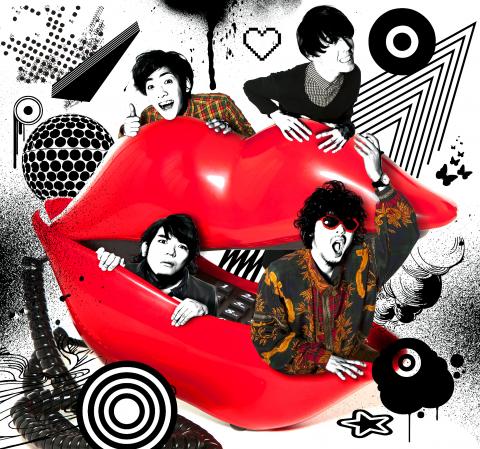Need a crash course on Taiwan’s best indie rock bands? The Megaport Music Festival (大港開唱) has got it covered this weekend.
The annual event, which takes place tomorrow and Sunday at Kaohsiung Harbor’s Pier 2 Art District (高雄駁二藝術特區), has a lineup of 46 bands that features the nation’s cream-of-the-crop indie artists, as well as several acts from Japan.
Organizers say the outdoor festival saw 15,000 visitors last year, and, with a few mainstream pop acts scheduled to appear, this edition should be no different. Sodagreen (蘇打綠) headlines the main stage tomorrow night, and celebrity model and singer Amber An (安心亞) performs a set of techno-pop tomorrow.

Photo Courtesy of The Wall
But the festival’s spread of non-mainstream artists with large followings will also attract crowds. Metal heroes Chthonic (閃靈) and beloved nakashi (那卡西) punk rock group Loh Tsui Kweh Commune (濁水溪公社, LTK) perform tomorrow, while indie-pop veterans Tizzy Bac and Aboriginal reggae rockers Matzka appear on Sunday.
Taipei live music venue The Wall (這牆) started Megaport in 2006 to encourage and develop a live music scene outside of the capital. Beloved pop-punks Fire Ex (滅火器), who play on Sunday, are a hometown favorite, and the festival offers a stage to up-and-coming bands such as the punk outfit The Locals (草地人), also from Kaohsiung, and Taichung hardcore metal band Flesh Juicer (血肉果汁機).
Megaport, which has bands playing on three outdoor stages and one indoor stage, is also putting on activities that are free to the public, including a skateboarding contest and a market selling arts and crafts and food.

Photo Courtesy of The Wall
One new addition to this year’s event is the NGO Village, a set of booths run by representatives from organizations that include Greenpeace and Amnesty International. There will also be booths manned by aid groups helping victims of the March 11 earthquake and tsunami that devastated Japan last year, the first anniversary of which falls on Sunday.
A full schedule for the festival can be viewed at www.megaport.com.tw.
Megaport 2012 — performers to catch
Omnipotent Youth Society (萬能青年旅店)
Artsy folk/blues rock band from China’s Hebei Province
Tomorrow, 1:50pm, Sea Dragon King Stage (海龍王舞台)
Enno Cheng (鄭宜農)
Indie-folk songstress and film actress with a pristine voice
Tomorrow, 5:50pm, Kamomai Stage (卡魔麥舞台)
Lin Sheng-xiang (林生祥)
Hakka folk singer and highly admired songwriter among many Taiwanese indie musicians for his grassroots ethos
Tomorrow, 7pm, Kamomai Stage (卡魔麥舞台)
The Novembers
High-energy Japanese alt-rock band that balances heavy guitars and pop smoothness
Tomorrow, 3:10pm, Sea Dragon King Stage (海龍王舞台)
Pay Money to My Pain
Japanese nu-metal/alt-rock band that sings in English
Tomorrow, 6:20pm, Sea Dragon King Stage (海龍王舞台)
Sodagreen (蘇打綠)
Intelligent pop from college students-turned-stars
Tomorrow, 8pm, Sea Dragon King Stage (海龍王舞台)
Loh Tsui Kweh Commune (濁水溪公社, LTK)
Kings of irreverent, satirical rock
Tomorrow, 9:10pm, Sea Dragon King Stage (海龍王舞台)
The Telephones
Electro/disco punk rockers from Japan
Sunday, 6:50pm, Sea Dragon King Stage (海龍王舞台)
Toe
Math rock/post-rock outfit from Japan
Sunday, 8:30pm, Sea Dragon King Stage (海龍王舞台)
Dog-G (大支)
Taiwan’s smoothest rapper in Hoklo [commonly known as Taiwanese]
Sunday, 6:10pm, Sea Dragon King Stage (海龍王舞台)
Windmill (風籟坊)
Slow-core rock a la Pavement, sung in Hoklo
Sunday, 3:30pm, Kamomai Stage (卡魔麥舞台)
Sugar Plum Ferry (甜梅號)
Post-rock heroes from Taipei
Sunday, 2:50pm, Sea Dragon King Stage (海龍王舞台)
Matzka
Reggae rock, Taiwan Aboriginal style
Sunday, 4:10pm, Sea Dragon King Stage (海龍王舞台)
Tizzy Bac
Enchanting piano rock
Sunday, 7:40pm, Dragon Goddess Stage (女神龍舞台)

In the March 9 edition of the Taipei Times a piece by Ninon Godefroy ran with the headine “The quiet, gentle rhythm of Taiwan.” It started with the line “Taiwan is a small, humble place. There is no Eiffel Tower, no pyramids — no singular attraction that draws the world’s attention.” I laughed out loud at that. This was out of no disrespect for the author or the piece, which made some interesting analogies and good points about how both Din Tai Fung’s and Taiwan Semiconductor Manufacturing Co’s (TSMC, 台積電) meticulous attention to detail and quality are not quite up to

April 21 to April 27 Hsieh Er’s (謝娥) political fortunes were rising fast after she got out of jail and joined the Chinese Nationalist Party (KMT) in December 1945. Not only did she hold key positions in various committees, she was elected the only woman on the Taipei City Council and headed to Nanjing in 1946 as the sole Taiwanese female representative to the National Constituent Assembly. With the support of first lady Soong May-ling (宋美齡), she started the Taipei Women’s Association and Taiwan Provincial Women’s Association, where she

Chinese Nationalist Party (KMT) Chairman Eric Chu (朱立倫) hatched a bold plan to charge forward and seize the initiative when he held a protest in front of the Taipei City Prosecutors’ Office. Though risky, because illegal, its success would help tackle at least six problems facing both himself and the KMT. What he did not see coming was Taipei Mayor Chiang Wan-an (將萬安) tripping him up out of the gate. In spite of Chu being the most consequential and successful KMT chairman since the early 2010s — arguably saving the party from financial ruin and restoring its electoral viability —

It is one of the more remarkable facts of Taiwan history that it was never occupied or claimed by any of the numerous kingdoms of southern China — Han or otherwise — that lay just across the water from it. None of their brilliant ministers ever discovered that Taiwan was a “core interest” of the state whose annexation was “inevitable.” As Paul Kua notes in an excellent monograph laying out how the Portuguese gave Taiwan the name “Formosa,” the first Europeans to express an interest in occupying Taiwan were the Spanish. Tonio Andrade in his seminal work, How Taiwan Became Chinese,